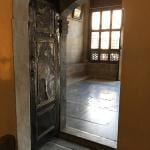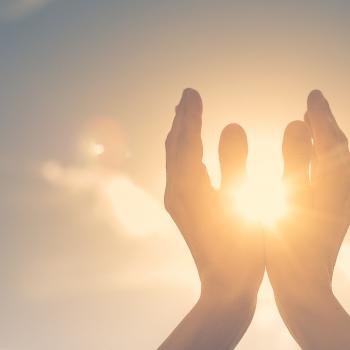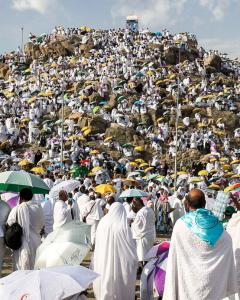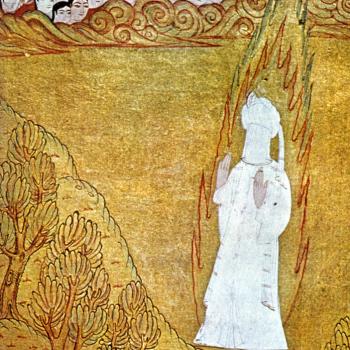A week and a half before Ramadan, I was awake in the early hours of the morning, consumed by a feeling of vulnerability. I’d just finished recording my debut song and part of me felt afraid to share it, afraid of how it might be received.
The fear of rejection gripped my body. As I tried to comfort this anxiousness with zikr, I looked out the window and saw the moon, in bright yellow, peek up over the eastern horizon. I can’t recall ever witnessing the moon appear so close to the earth before, probably because my new home offers me a view of the sky I’ve never had before.
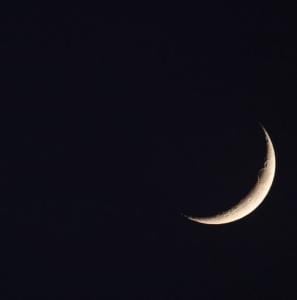
It was mesmerising to watch it climb slowly, becoming whiter and whiter as it rose. Likewise, the constriction gently let go of my body and was replaced with an overwhelming sensation of lightness rising within. In this space of stillness, the words of a new song started flowing from the depths of my heart.
I scribbled the lyrics into my notebook. They felt like a gift, an affirmation from my Sustainer, my Rabb, that I needn’t worry; I could trust the inspiration coming from my Inmost Heart and share it without fear. The song that arrived in the wee hours of that morning, called In the Still of the Night, is about the power of night vigil: The practice of deep night-time worship that I’m especially devoted to during Ramadan. The chorus speaks of how it is during this time that sincere prayers are heard — and answered.
This Ramadan, I’ve been reflecting on the mystery of prayer. My understanding of the concept has evolved over time. I used to see prayer as an act of asking the Divine for what I want, usually specific worldly possessions and pleasures, whether they be love and relationship, a new job, a new home, etc.
That is certainly part of it; being able to articulate to Allah what I don’t want in life, and what I do want, has helped me to cultivate healthy boundaries and brought about a lot of positive changes in my life in recent years.
But what leaves me in utter awe is the ways our Sustainer answers the deepest longings of our hearts that we are not even aware of, and without us even needing to ask. I’m coming to see that prayer is not so much about asking for something than about being open to receiving the inflow of Spirit. It’s about removing the barriers within that historically prevented me from being receptive to the Infinite Generosity of Allah, the Most Generous (Al Karim) and the Giver of Gifts (Al Wahhab).
I say this because this gift of songwriting and singing that I am embarking on is not something I ever prayed for, or frankly could have ever fathomed to ask for. While I’ve always loved singing, usually while cleaning my home, I never prayed for the Divine to carve a path for me to sing. Never even for a moment contemplated a singing career. I never considered myself a poet and had never — before last year — written a song.
And yet, now it comes so naturally. The inspiration to do so arose spontaneously and has filled me with such joy and purpose. Above all, it has increased my bewilderment with the boundless possibilities that emerge when we surrender to the flow of the Divine Reality by slowly emptying of self-limiting beliefs and distortions of the ego.
As I write this, I open the Pocket Rumi to some wisdom from Mevlana:
Your Mysterious Giving
Oh Lord, truly, Your grace is not from our work,
But from Your mysterious giving.
Save us from what our own hands
might do;
lift the veil, but do not tear it.
Save us from the ego; its knife has
reached our bones.
Who but You will break these chains?
Let us turn from ourselves to You
Who are nearer to us than ourselves.
Even this prayer is Your gift to us.
How else has a rose garden grown from
these ashes?
Prayer is indeed a gift. One of the meanings of the Arabic root word for prayer, salawat, is “to remain attached.” In a sense, prayer is about being so attached to our Sustainer and so empty of our lower selves that we are in a position for Spirit to literally pour inspiration through us into the world.
I’ve found cultivating this place of attachment is most powerful during the still nights of Ramadan. For the past 10 years, I’ve been awake almost every night of the holy month in prayer and contemplation. Sometimes that’s involved reading and memorising verses of the Quran or doing zikr on Allah’s Beautiful Names. In other moments, it’s involved praying for those who have departed, including my father who passed away in 2010 on the second day of Ramadan.
For the past several years, the 30 days of fasting have been an intense period of feeling and healing the trauma that is separating me from my heart. Without fail, it is during night vigil that the greatest insights and awakenings unfold.
There’s a Hadith of the Prophet Muhammad, peace and blessings be upon him, that I have been drawn to since I heard it about a decade ago. In a Divine saying transmitted through the prophet’s heart, the Divine says: “I am close to the thought that my servant has of me. And I am with him whenever he remembers Me. If she remembers Me in her self, I remember her in My Self. And if she remembers Me in a gathering, My remembrance is still greater. And if he approaches Me one hand’s length, I approach him by a cubit. And if he takes a step toward Me, I come running toward him.”
The generosity encompassed in these words brings me to my knees every time I hear my murshid, Kabir Helminski, recite them in one of the guided meditations on the HeartSpace app. It’s breathtaking how we can be blind to the treasures contained within our hearts.
Which brings me back to the song. My musical collaborator and I loved the lyrics and melody of In the Still of the Night so much we decided to record it in time for Ramadan. We were even able, despite the lockdown, to assemble a choir of beautiful voices of friends for the chorus.
And as I recorded the vocals, memories from my childhood that I’d long forgotten started to pop into my consciousness. In one, I was 16 and spinning gleefully in an empty field near my high school one evening, singing Colours of the Wind, the theme song for the Disney movie Pocahontas. I recall really loving how that song captured the wisdom of nature. It’s one of the few sweet memories I have of an otherwise very dark period of my life. As it happens, many of the songs I’ve written in the past year are inspired by nature, and the spiritual guidance it offers us when we listen with our whole being.
The insight that arrived for me during Ramadan is that it was the pure, sincere longing of my 16-year-old self — her prayer — being answered in my inspiration to sing now, 24 years later.
So as we enter the middle part of Ramadan — that juicy and supple section of the month that’s delicious like the centre of a sweet succulent fruit, still half uneaten — I hold dearly to the night vigil and the wisdom of praying not for things, but for an ever-deepening connection to my Rabb.

